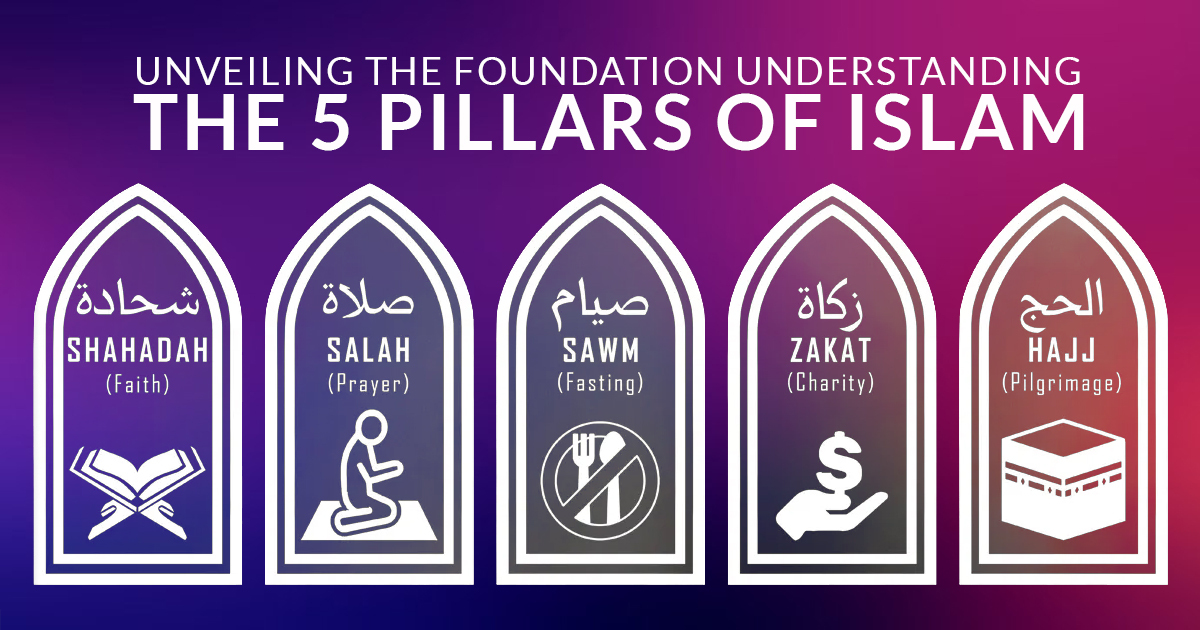Islam, one of the world’s major religions, is built upon a foundation of five fundamental practices known as the Five Pillars of Islam. These pillars serve as guiding principles for Muslims worldwide, shaping both their spiritual and everyday lives. In this comprehensive guide, we’ll delve deep into each of these pillars, exploring their significance, rituals, and broader implications within the Islamic faith.
Shahada: Declaration of Faith
The first pillar of Islam is Shahada, which translates to the declaration of faith. It serves as the cornerstone of the Islamic belief system, affirming the oneness of Allah and the prophethood of Muhammad. The Shahada is a simple yet profound declaration, stating, “There is no god but Allah, and Muhammad is the messenger of Allah.”
1. Significance: The Shahada encapsulates the core belief in monotheism and the finality of prophethood.
2. Rituals: Muslims recite the Shahada daily as part of their prayers and affirm it during significant life events, such as conversion or initiation into Islam.
3. Implications: By professing the Shahada, Muslims acknowledge their submission to Allah’s will and the guidance provided through Muhammad’s teachings.
Salah: Ritual Prayer
Salah, or ritual prayer, is the second pillar of Islam and holds immense significance in the daily lives of Muslims. It involves performing a series of prescribed prayers at five designated times throughout the day, aligning one’s actions with spiritual devotion.
1. Significance: Salah fosters spiritual discipline, mindfulness, and a continuous connection with Allah throughout the day.
2. Rituals: The five daily prayers consist of specific movements and recitations, including standing, bowing, prostrating, and reciting verses from the Quran.
3. Implications: Salah serves as a means of seeking forgiveness, guidance, and blessings from Allah, fostering humility and gratitude in the practitioner’s heart.
Learn More: What Are the 5 Pillars of Islam?
Zakat: Almsgiving
Zakat, or almsgiving, is the third pillar of Islam, emphasizing the importance of charity and social responsibility within the Muslim community. It involves giving a portion of one’s wealth to those in need, thereby promoting economic equality and compassion.
1. Significance: Zakat purifies one’s wealth and serves as a means of redistributing resources to support the less fortunate members of society.
2. Rituals: Muslims are obligated to give a specific percentage (usually 2.5%) of their annual savings to eligible recipients, including the poor, needy, indebted, and wayfarer.
3. Implications: Zakat fosters empathy, solidarity, and a sense of shared responsibility, strengthening bonds within the community and alleviating poverty.
Sawm: Fasting during Ramadan
Sawm, or fasting during the month of Ramadan, is the fourth pillar of Islam, marking a period of spiritual reflection, self-discipline, and heightened devotion. Muslims abstain from food, drink, and other physical needs from dawn till sunset throughout the month.
1. Significance: Fasting during Ramadan is a means of purifying the soul, seeking forgiveness, and empathizing with the less fortunate who experience hunger and deprivation.
2. Rituals: Muslims observe Sawm by abstaining from all food, drink, smoking, and marital relations during daylight hours, breaking their fast with a meal known as iftar at sunset.
3. Implications: Sawm cultivates self-discipline, gratitude, and mindfulness, strengthening one’s relationship with Allah and fostering empathy for those in need.
Hajj: Pilgrimage to Mecca
Hajj, the pilgrimage to the holy city of Mecca, is the fifth pillar of Islam and represents the culmination of spiritual journeying for Muslims worldwide. It is a once-in-a-lifetime obligation for those who are physically and financially able to undertake the journey.
1. Significance: Hajj symbolizes unity, equality, and submission to Allah, as pilgrims from diverse backgrounds come together to fulfill a sacred duty.
2. Rituals: The Hajj pilgrimage involves a series of rituals, including circumambulating the Kaaba, performing symbolic stoning of the devil, and standing in vigil on the plains of Arafat.
3. Implications: Hajj fosters a sense of unity among Muslims, transcending cultural, linguistic, and geographical barriers, while also serving as a profound spiritual experience of self-discovery and renewal.
Read More: The First Step to Converting to Islam
Conclusion:
The Five Pillars of Islam constitute the foundational principles upon which the Islamic faith is built, guiding Muslims in their spiritual journey and everyday lives. By understanding and embodying these pillars, Muslims seek to cultivate a deeper connection with Allah, foster compassion and empathy for others, and uphold the values of justice, humility, and devotion.
FAQs About Unveiling the Foundation: Understanding the 5 Pillars of Islam
What is the significance of the Five Pillars of Islam?
The Five Pillars serve as the foundation of Islamic faith and practice, guiding Muslims in their spiritual journey and everyday lives.
Are the Five Pillars obligatory for all Muslims?
Yes, the Five Pillars are obligatory for all Muslims, serving as essential acts of worship and devotion.
Can Muslims fulfill their religious duties without adhering to the Five Pillars?
While the Five Pillars are central to Islamic practice, Muslims may engage in additional acts of worship and good deeds to further enhance their spiritual growth.
How do the Five Pillars promote unity within the Muslim community?
The Five Pillars foster a sense of unity by emphasizing shared beliefs, values, and practices among Muslims worldwide, transcending cultural and geographical differences.
Are there variations in the observance of the Five Pillars among different sects of Islam?
While the core principles of the Five Pillars remain consistent across sects, there may be variations in specific rituals and interpretations based on individual or sectarian beliefs.













